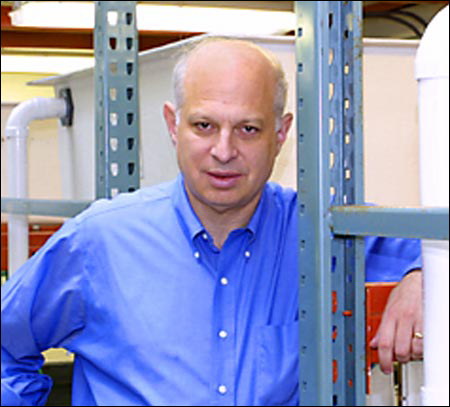HMS launches new department to study systems biology:
Will seek to understand the causes of diseases at the level of cells, organ systems

The Medical School (HMS) made a significant commitment to the emerging field of systems biology in the creation of the Department of Systems Biology (DSB), one of the first department-level systems biology programs in the nation. The announcement was made Sept. 23.
Systems Biology seeks to build from our current knowledge of genetic and molecular function to an understanding of how a whole cell works as a system and from there to multicellular systems such as organs and whole animals. The Department of Systems Biology will be Harvard Medical School’s first completely new department in more than two decades and, with more than 20 faculty recruitments expected, will be one of its largest departments.
A quantitative understanding of an entire subcellular, cellular, or organism system could dramatically speed drug discovery, by allowing one to predict the effects of attacking a specific target within the context of the complex cellular circuits. New drugs often fail after the expenditure of millions of dollars because the effect on a single gene or protein target in the test tube doesn’t have the predicted effect when tested in the human body.
“As we understand more about the tiniest pieces that we are made of, it becomes increasingly clear that we do not understand how they work together as systems,” said Marc Kirschner, Carl W. Walter Professor of Cell Biology and the first chair of the new department. “We need to build on the foundation of molecular biology to construct an understanding of the architecture of the cell and how cells cooperate across organ systems, with a predictive model of physiology as the ultimate goal.”
“It is worrying that we do not understand how most drugs work and essential that we know in detail how both genetic mutations and the environment contribute to disease,” said Dean of the Medical School Joseph B. Martin. “Answering such questions requires building predictive models of cells, organs, and ultimately, organisms. And this requires not only advanced computational models but the acquisition of new quantitative data, often with new methods capable of interrogating the activity of a large number of genes within whole cells or whole organisms. In evaluating this challenge, we reached the conclusion that the scale of the effort required demands a new department.”
This department will consist of newly recruited faculty from areas such as mathematics, computer sciences, physics, and engineering, as well as from traditional biomedical fields – harnessing talent from broad disciplines that can develop the theoretical framework for complex systems biology problems. More than 20 full-time faculty will be recruited and the HMS Systems Biology Department will receive significant initial funding from the University and the Medical School. The new department will have special programs for the education of physical scientists in biology and special core facilities to promote interaction between disciplines. In concentrating on education, the department will provide a learning environment to facilitate training the systems biologists of the future.
While being interdisciplinary, DSB will also be interinstitutional, linking faculty from the Medical School with faculty at its affiliated hospitals and the University. The department will seek joint appointments with hospital-based departments, and several members of the department are expected to be jointly appointed with the Faculty of Arts and Sciences. An explicit commitment has been made to both undergraduate and medical postgraduate education. Particularly strong links with the Bauer Center for Genomic Research are expected, as well as collaborations with other efforts in the Boston area, such as M.I.T.’s Computational and Systems Biology initiative (CSBi).
Two additional founding faculty members have been named, Timothy Mitchison, currently a member of the HMS Cell Biology Department, and Lewis Cantley, HMS professor of medicine at Beth Israel Deaconess Medical Center. Both already use quantitative and modeling approaches in their own work.
“Recruiting Mitchison and Cantley to the new venture brings unparalleled strength in quantitative cell biology, chemistry, and the field of protein interaction – subjects that will give a foundation to this new discipline” said Kirschner.
Kirschner, a pioneering cell biologist, has extensive experience both developing new departments and creating interdisciplinary efforts. Kirschner led the 1993 formation of the Medical School’s Department of Cell Biology. This department was created out of the Department of Anatomy and Cellular Biology and the Department of Cellular and Molecular Physiology, and following its formation, Kirschner led the development of an integrated graduate program. In 1999, Kirschner helped create the Harvard Institute for Chemistry and Cell Biology, an innovative collaboration of chemists and cell biologists who synthesize small molecules and apply them to learn about gene and protein function.
Related story:




